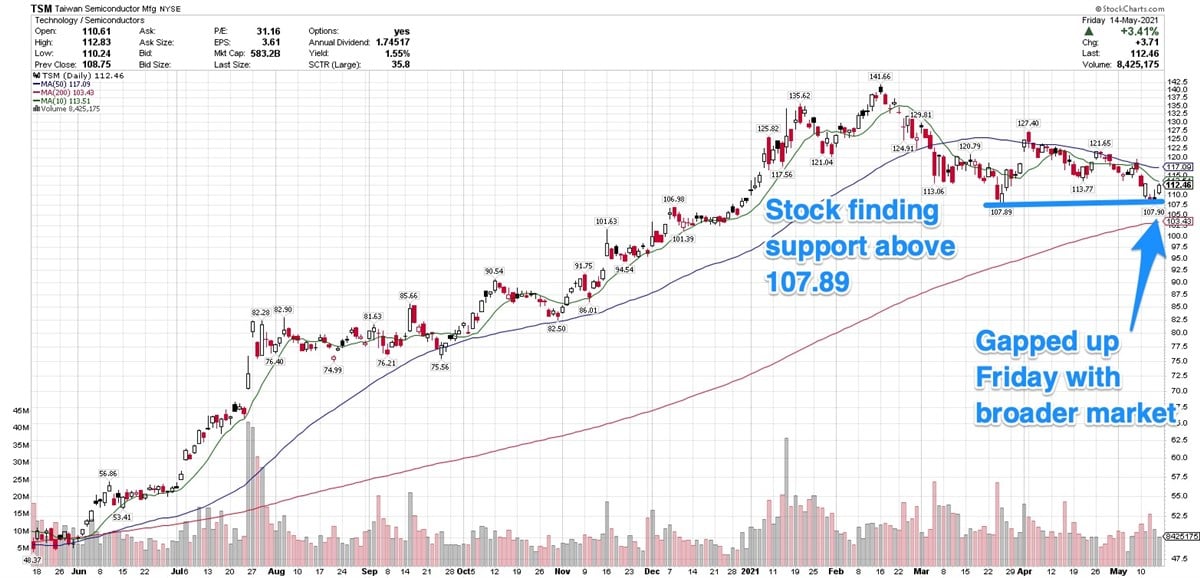Taiwan Semiconductor To Invest More In Arizona Chip Factories Taiwan Semiconductor Manufacturing said it would invest billions into its planned facilities in Phoenix. The news came just weeks after the company announced another expansion of the same plant. The company is also prioritizing the manufacturing of automotive chips this year.
By Kate Stalter
Our biggest sale — Get unlimited access to Entrepreneur.com at an unbeatable price. Use code SAVE50 at checkout.*
Claim Offer*Offer only available to new subscribers
This story originally appeared on MarketBeat

Shares of Taiwan Semiconductor (NYSE: TSM) have been correcting since mid-February and are down 5% since the company reported first-quarter results last month.
Last week, news broke that the chipmaker may invest billions into U.S.-based chip factories.
Earlier in May, TSMC said it would build as many as six additional factories in Arizona, in addition to a $12 billion plant previously announced in May of 2020. That facility, planned for Phoenix, will fabricate 12-inch wafers. It's expected to be up and running in 2024.
That timetable tells you that these things take time, and won't do anything to address the current chip shortage. However, as the shortage makes clear, demand for semiconductors and semiconductor equipment will only increase over time, as a rising number of consumer goods, including cars, require chips.
Last week's announcement was an addition to the plans revealed in early May. The company did not make an announcement or confirm the news, but sources spoke to media outlets about the plans.
More Sophisticated Manufacturing Process
In the latest iteration of TSMC's plans for the Phoenix location, the company is reportedly considering whether the new facilities should be based on a 3-nanometer chipmaking technology, which uses a more sophisticated process than in the first plant.
Also, TSMC is outlining plans for next-generation chips that would be produced in Phoenix over the next 15 years.
President Biden's $2.2 trillion proposal for infrastructure buildout includes $50 billion for the U.S. semiconductor supply chain. The president also added more than $500 billion for chip industry research and development
President Biden's $2.2 trillion infrastructure proposal, released last week, includes $50 billion for bolstering the domestic chip supply chain. In addition, Biden included more than $50 billion for research and development initiatives affecting chip and electronics industries and the communications sector.
U.S. tech giants Apple, Microsoft, Google and Amazon, all big chip buyers, created a lobbying group, the Semiconductors in America Coalition, to push for the subsidies. Chipmaker Intel is also part of that group.
Intel would, of course, be a rival to TSMC to receive the subsidies. Although the money would be designated for production in the U.S., overseas firms with factories in the U.S. are eligible to receive subsidies.
On the flip side, domestic chipmakers such as Nvidia and Qualcomm have manufacturing facilities in Asia. Even Intel, which has most of its operations stateside, conducts some manufacturing in Ireland and China.
When TSMC reported its first quarter in April, earnings came in at $0.95 per share, up 28% from the year-ago quarter. The company reported double-digit earnings gains over the past seven quarters, without a slowdown in either the first or second quarter of 2020, which illustrates the strength (and necessity) of the chip industry.
Revenue was $12.7 billion in the quarter, a year-over-year gain of 24%. Revenue also grew at double-digit rates in the past seven quarters.
In the quarter, the company topped analysts' earnings views, but missed on revenue.
Prioritizing Automotive Industry
In the earnings conference call, CEO C.C. Wei cited the automotive industry, which he said was weak since 2018. Covid-19 made that worse, with reduced demand from automakers, who idled factories, through the third quarter of 2020.
"We only began to see sudden recovery in the fourth quarter of 2020. However the automotive supply chain is long and complex, which is on inventory management practices," Wei said. "From chip production to car production, it takes at least six months with several tiers of suppliers in between. TSMC is doing its part to address the chip supply challenges for our customers."
The company said it will prioritize the manufacturing of automotive chips this year.
As the stock is currently consolidating, it's not an ideal time to buy. The stock has found support above $107.89, testing that level on May 13 before rebounding.
Shares closed Friday at $112.46, gapping higher along with the broader market, for a gain of $3.71, or 3.41%.
Despite Friday's upside action, there's still not enough conviction among institutional buyers to indicate that the stock's uptrend has begun in earnest.
Featured Article: What is an Initial Public Offering (IPO)?









